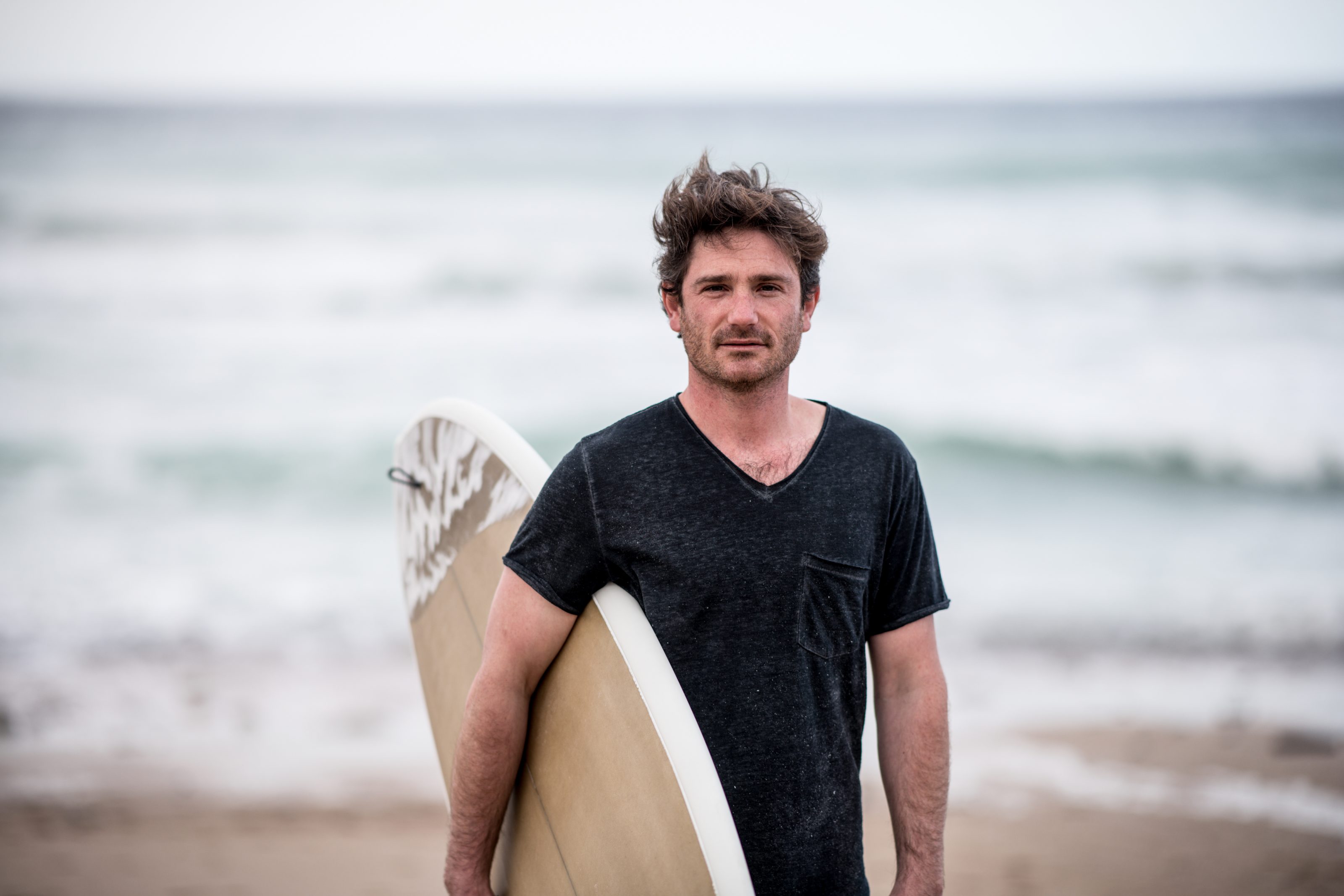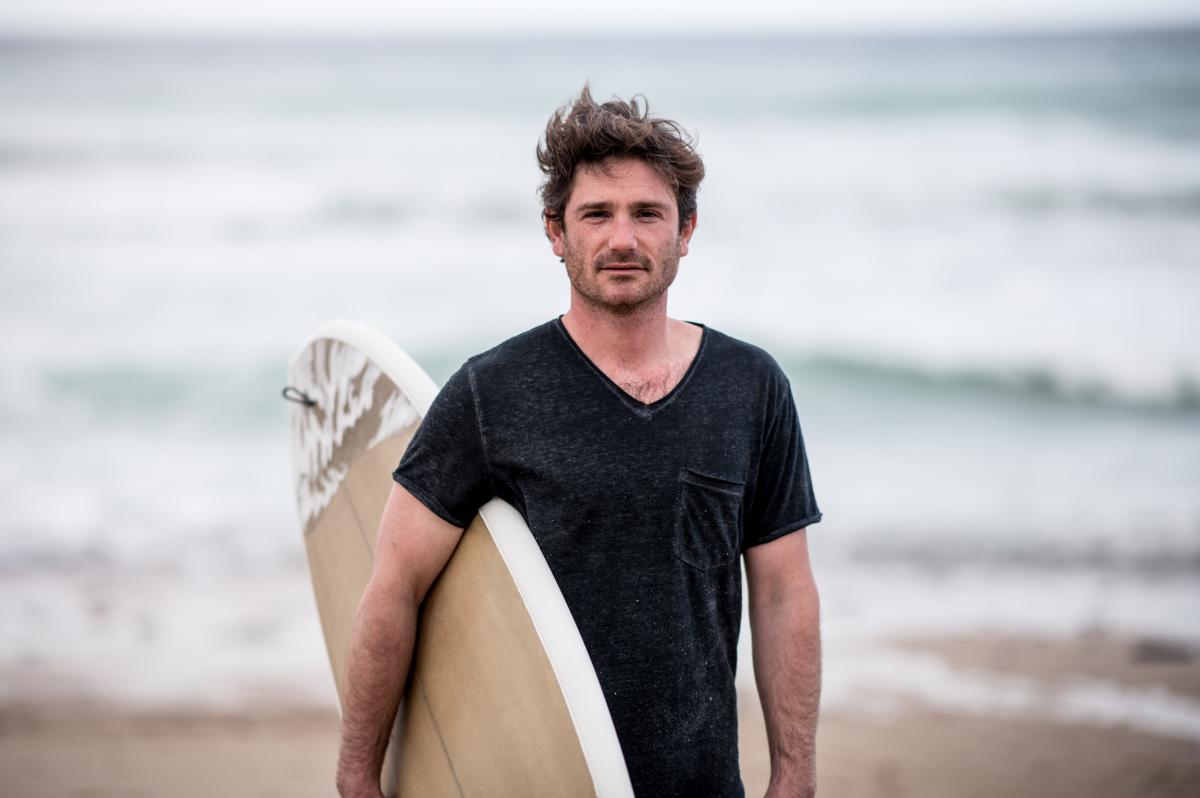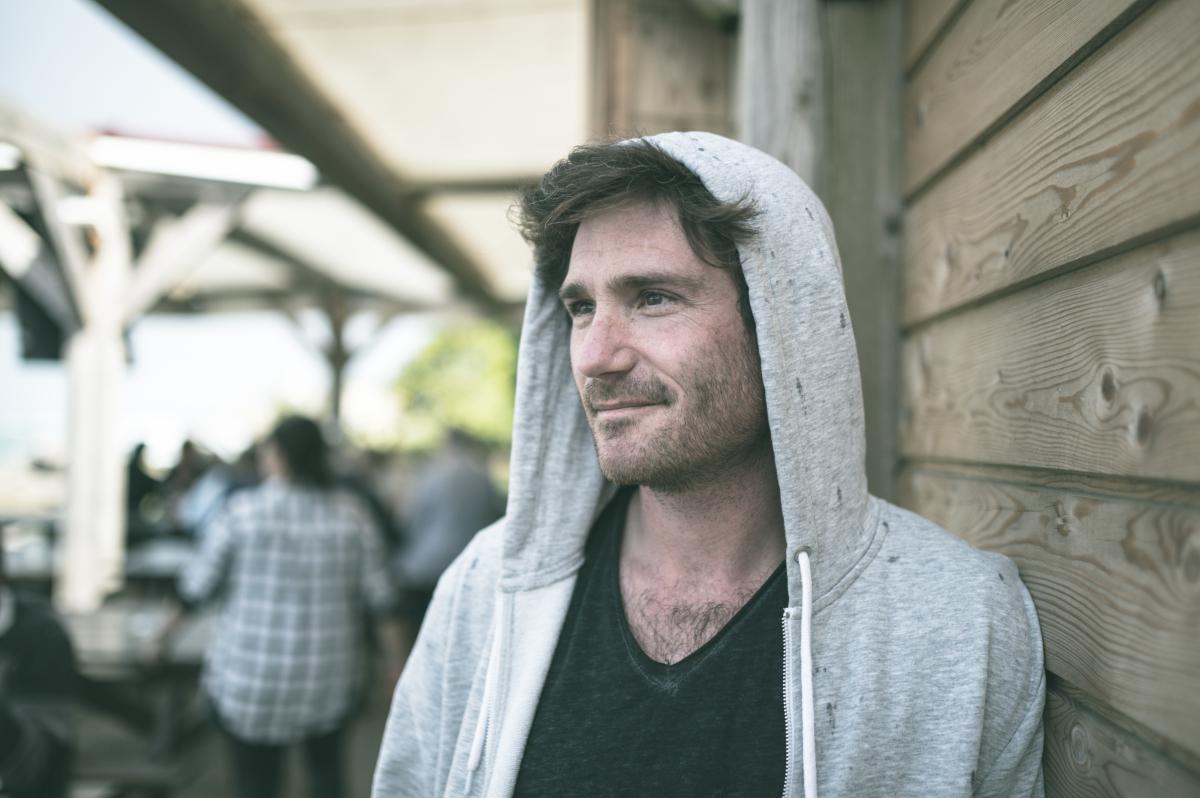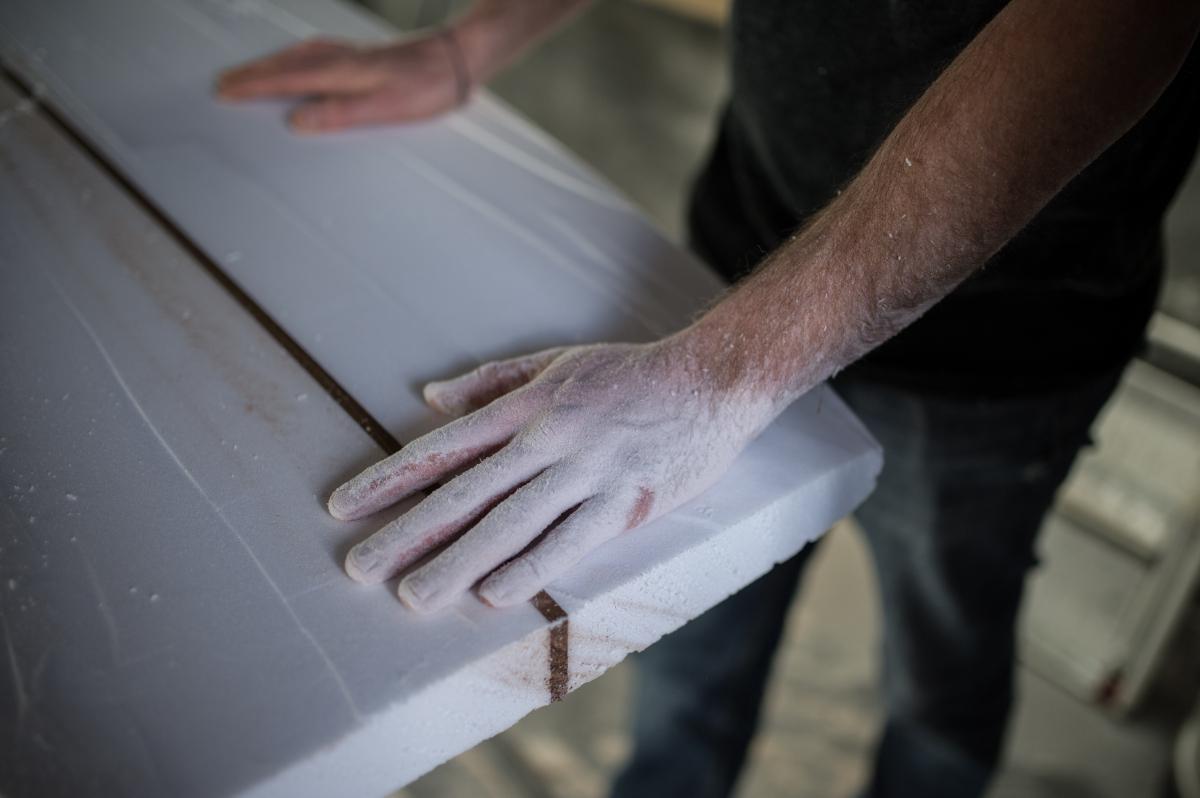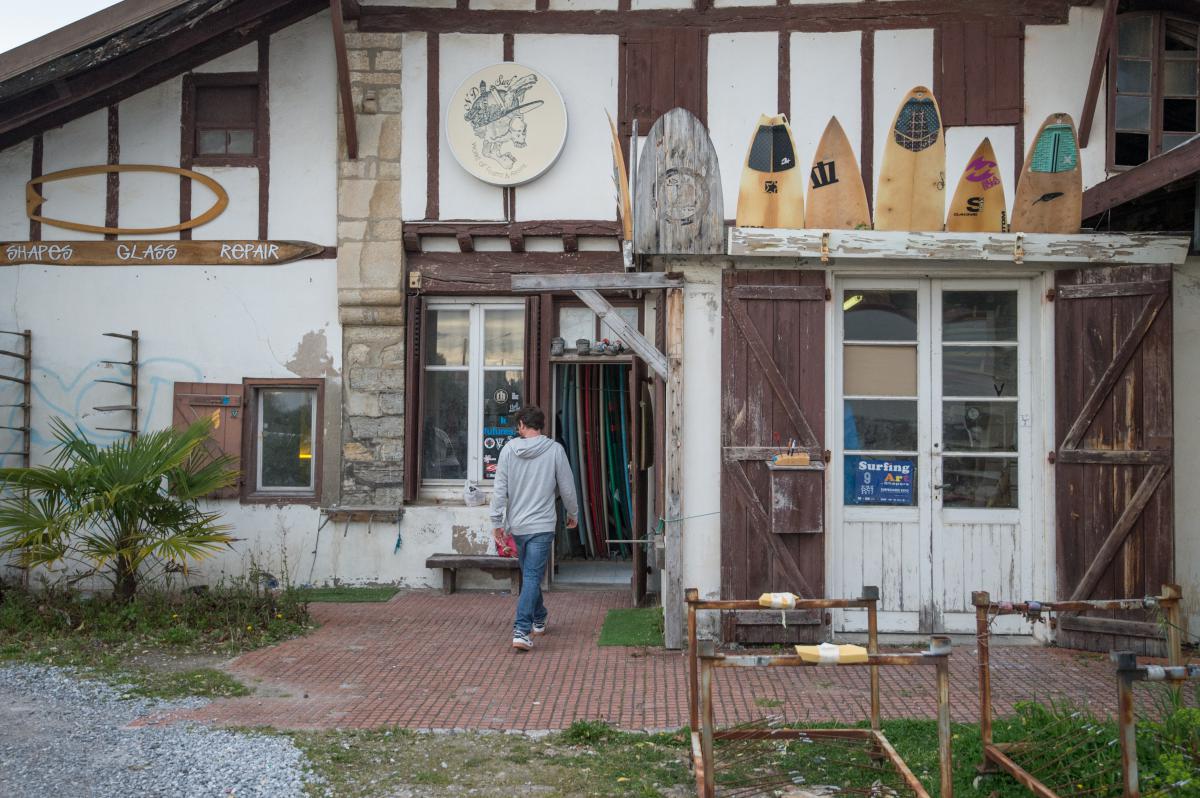Docteur Delors & Mister Nicolas
Depuis 2013, Nicolas Delors imagine, crée et réalise des planches sur-mesure pour des surfeurs qui ont envie d’une board qui leur ressemble. Dans son atelier de Bidart, ce shaper insuffle sa passion et son goût du travail bien fait.
Board, shape, outline, fish, foam, egg, minimalibu, rail, rocker… Si le vocabulaire des planches est familier pour les surfeurs de la Côte basque, c’est une terre inconnue pour les non pratiquants. être accessible et pointu, artisan d’art et créatif, cool mais exigeant, c’est tout l’art du travail de shaper que Nicolas exerce depuis cinq ans. Tout a commencé un matin dans son atelier de Bidart. Le ‘ Docteur surf ’, comme il est surnommé s’est fait une belle réputation dans la réparation des planches malmenées par les shore breaks de l’Atlantique ou les collisions estivales. à l’extérieur de l’ancienne ferme basque en bordure de route qui lui sert d’atelier, il fait sécher une planche, la sienne, qu’il s’est fabriquée. Un client flashe littéralement sur ce modèle et traverse la chaussée pour lui demander de lui en fabriquer une équivalente. “ Cela a duré deux heures de discussion, je ne voulais pas ; d’abord parce qu’on ne peut pas faire deux fois la même planche et aussi, peut-être, parce qu’à cet instant-là je ne me sentais pas forcément légitime pour en fabriquer. ” à l’époque, l’atelier du Dr Surf est avant tout un atelier de réparation qui tourne bien. Mais le futur client insiste et Nicolas passe outre son entêtement – c’est lui qui le dit – pour lui fabriquer une board. C’est le début d’une aventure où son talent, ses mains, sa précision et sa patte l’ont imposé peu à peu dans l’univers des shapers.
Ces magiciens des planches, à la fois artisans d’art et artistes, dessinent, conçoivent et fabriquent des planches uniques et sur-mesure. C’est aujourd’hui l’activité phare de Nicolas, même s’il a conservé l’enseigne ‘ Dr surf ’… Comme un clin d’oeil à une aventure qui s’est construite au fil d’un parcours atypique, mu par l’intuition d’aller au bout de ses passions.
De la résine
à la planche
Car lorsqu’il découvre cet atelier de Bidart en 2009, lui le natif de la commune, termine une formation d’ajusteur-monteur pour l’aéronautique. “ à 17 ans, je suis rentré en apprentissage dans une PME locale de stratification de résine. J’ai adoré cette expérience, j’ai adoré travailler la matière. Moi qui me cherchais un peu, ça a été une super expérience. Dans cette entreprise, j’ai appris à faire des moules et des pièces, à maîtriser la fibre et la résine. Tout ce process de fabrication m’a énormément plu. Je suis resté dans l’entreprise jusqu’à l’âge de 25 ans. Et puis j’ai eu envie d’autre chose. Alors je suis parti en interim dans l’aéronautique et là, j’ai ajouté de la précision et de la rigueur à mon travail. Je me suis formé pour devenir ajusteur-monteur et travailler dans le fuselage et j’ai obtenu mon diplôme en 2008. Mais avec la crise, les sociétés aéronautiques ont débauché les prestataires extérieurs. Un matin, je suis passé devant cette ancienne ferme basque abandonnée en me rendant à ma formation. J’ai flashé sur le lieu. Le soir-même, je contactais le propriétaire. C’est ainsi que j’ai ouvert l’atelier, du jour au lendemain, à fond, dans le doute, mais avec l’intuition que c’était ma voie. J’étais surfeur, je réparais déjà mes planches, je savais manier la résine, j’y suis allé. Dans ce milieu où l’on a une réputation de dilettante, je me suis appliqué à réparer vite et bien. ” Le bouche à oreille fait le reste et construit une réputation de sérieux et de travail bien fait. Mais le confort et l’esprit surf ne s’accordent pas trop. Alors Nicolas s’est lancé un nouveau défi.
Shaper rétro
Toujours à l’affût d’une nouvelle vague de passion, Nicolas a décidé de se consacrer quasi exclusivement au métier de shaper. “ Pour moi les choses sont très naturelles : quand quelque chose m’intéresse, j’y vais à fond. ” Aujourd’hui ce qui l’intéresse, c’est de “ créer et de réaliser des planches sur-mesure, personnalisées, esthétiques et qui donnent du plaisir sur l’eau. Une planche de surf, c’est très personnel. Les critères techniques comptent – le poids, la taille, le niveau de surf – mais aussi l’endroit où l’on surfe. On ne va pas faire la même planche pour un surfeur de la Côte Basque ou de la Côte landaise. Au Pays basque, on a de belles vagues mais assez difficiles à surfer. Alors, on module les courbes (le rocker) pour amener de la vivacité à la planche ”. Vagues creuses et planches courbées ou moins creuses et planche tendue, Nicolas est intarissable sur les discussions qu’il a avec le client pour que ce dernier “ se fasse plaisir avec une planche qui a du style et apporte du fun ”. Son métier commence par un goût de l’échange et du relationnel. “ Un bon shaper, c’est un type passionné qui sait répondre aux attentes, anticiper, qui est créatif. Il faut du feeling et vraiment s’intéresser au surfeur qui vient vous voir. Si l’on vient juste me demander d’exécuter une commande, ça ne me va pas. J’ai besoin que les gens viennent dans mon univers. ” Dans son univers, il aime insérer une dimension artistique et esthétique. “ Je colorie la résine, je fais même des incrustations de coquillages ou de grains de café, c’est un peu ma patte. J’aime soigner les détails, les finitions, harmoniser les couleurs et je m’attache à sourcer des matières premières de qualité. ”
A Biarritz, ce créatif dans l’âme collabore avec les artisans tatoueurs de Bleu Noir ou avec l’illustratrice Mash dont il apprécie les dessins tropicaux. Il lui a même demandé d’illustrer la planche pour enfant qu’il est en train de créer. Il admire le travail du collectif de glasseurs/ponceurs The Lucky Bastards créé par Tristan Mausse et Paul Lefevre. Tout récemment, c’est la marque de montre premium March Lab qui lui a commandé cinq planches pour décorer un corner au Bon Marché, la référence parisienne du style et du bon goût. Nicolas commence à ouvrir son champ d’action, à faire des expos, à travailler avec des galeries d’art et à être reconnu dans son style très personnel, à l’image du joli logo au trait noir dessiné par sa fille. « Une planche c’est un totem, surtout ici sur la Côte, c’est un objet tellement évocateur ! ». Il rêve de créer un festival des shapers et de faire reconnaître les artisans du surf. Inspiré par le lifestyle californien, Nicolas aime distiller une dose de coolitude américaine et imprimer une patte rétro à ses planches. « J’aime certaines formes créées par des Californiens, que ce soit de grandes planches qui se surfent avec du style ou des planches un peu hybrides. De toute façon, je ne fais que ce que j’aime. »
Shape, shape, shape
Plus de 10 heures sont nécessaires à la fabrication d’une board sur-mesure. Le shaper dispose de ses propres gabarits ou patrons, comme un tailleur en couture. Il commence par découper le pain de polyuréthane, met en forme selon ses patrons, affine les formes, les courbes, ponce une première fois. Puis le shaper appose la fibre de verre et la résine, ajoute la couleur et d’éventuelles incrustations, applique un gloss de finition, opère un ultime ponçage et fait sécher. Ce leitmotiv mêlant plaisir et style s’inscrit à fond dans son approche du travail. “ Comme tous mes copains, je guette la vague et je peux fermer l’atelier pour aller surfer, mais je peux aussi bosser toute une nuit pour finir une planche. C’est une chance dingue de travailler ainsi ! J’ai une grande liberté, je prends le temps. Quand je reviens de surfer, ça me permet de repartir au boulot plus zen. La passion fait partie de la pratique. Mais j’ai surtout la chance de courir au travail tellement j’aime ce que je fais ” s’enthousiasme Nicolas, qui a envie de transmettre qu’il est possible d’allier décontraction, exigence, rigueur et créativité dans le travail. “ Je ne garantis pas le fun mais je garantis un bel objet ! J’ai réussi à faire partie du cercle des shapers et à en vivre. Dans ce métier, on part de rien pour faire quelque chose. On ne fait jamais deux modèles identiques. C’est ça la magie. Une planche, c’est un objet qui porte un peu plus que son usage. C’est un travail avec de l’intention et de l’humeur. Derrière une planche, il y a une philosophie, des valeurs, une personnalité. Je me fais plaisir comme ça.
Parce que travailler sans prendre du plaisir, ça ne me va pas du tout, autant aller surfer ! ” conclut-il en boutade.
Doctor Delors and Mister Nicolas
Since 2013, Nicolas Delors has been designing, creating and manufacturing customized surfboards for surfers seeking a board to reflect their personality. In his workshop in Bidart, the shaper puts all his passion and determination into producing quality work.
Board, shape, outline, fish, foam, egg, mini-Malibu, rail, rocker… The vocabulary is clear to the surfers on the Basque Coast but it’s a foreign language to anyone who has never ridden the waves. Being a shaper means being open to new ideas yet meticulous, having the precision of a craftsman and enough imagination to be creative, being cool and relaxed and yet demanding high standards – and that’s exactly what Nicolas has been doing for five years now.
Everything began one morning in his workshop in Bidart. The “Surfboard Doctor”, as he’s commonly known, has built himself a great reputation repairing the boards that have been put through their paces by the shore breaks of the Atlantic or that have come off worst after a collision in the waves in summer. On the roadside outside the old Basque farm he uses as a workshop, he put a board out to dry. It was his board, one he made himself. A customer fell for the model as he was driving past one day and stopped to ask Nicolas if he could make him one exactly the same. “We talked about it for two hours. I didn’t want to make it, to start with because you can’t make the same board twice, and perhaps because at that time I didn’t think I had enough experience under my belt to make it either.” Back then, the Dr. Surf workshop was mainly a repair shop that had a steady flow of customers. But the future customer insisted and Nicolas put his stubbornness to one side (his own words) to make the board. It was the start of a great adventure, where his talent, his hands, his precision and his own personal hallmark have helped him make his mark in the world of shapers. These surfboard wizards, both craftsmen and artists, sketch, design and manufacture unique and customized boards. Today it’s Nicolas’ main business, even though he has kept his “Dr. Surf” sign – a little nod to an adventure that grew and developed a little off the beaten track, but was driven by Nicolas’ desire to follow his instinct and make his living out of what makes him feel alive.
From resin block to surfboard
When he came across the workshop in Bidart in 2009 – being from that area himself – he had just finished a training period to be a fitter-assembler for the aeronautical industry. “When I was 17, I did an internship in a local resin lamination industry. It was a fantastic apprenticeship and I loved working with the material. I still didn’t really know what I wanted to do then in terms of a career, and it was a great learning experience. I learnt how to make moulds and parts, to handle fibre and resin – I really enjoyed the entire manufacturing process. I stayed with the company until I was 25 and I felt the need to do something different. I did some temping work in the aeronautical industry and that experience helped me to work with greater precision and rigour. I trained to become an fitter-assembler and work in the fuselage, and I got my diploma in 2008. But with the economic crisis, the aeronautical companies were laying off their external contractors. One morning on my way to my training course, I drove past this old, abandoned Basque farm and I fell for it immediately. That same evening, I contacted the owner and that’s how I ended up opening the workshop here, almost overnight, a little doubtful but fired with enthusiasm and the gut feeling that it was what I was meant to do. I was a surfer, I was already repairing my own boards, I knew how to handle resin, and I decided to take the plunge. It’s easy to gain a reputation as a scam artist in the surfing world, so I made sure that when I did repairs, they were fast and professional.” Word-of-mouth did the rest and Nicolas soon earned himself a reputation as someone who knew his stuff and produced quality work. But surfing and sitting on your laurels don’t mix – so Nicolas set himself a new challenge.
Retro Shaper
Always on the alert for the next wave of enthusiasm, Nicolas decided to focus almost entirely on being a shaper. “It’s very simple: when something interests me, I don’t do it by halves.” What interests him today is “creating and making customized boards that look good and perform well in the water. A surfboard is a very personal thing. The technical criteria count of course, like a surfer’s weight, height and proficiency, but so does where he surfs. You don’t make the same kind of board for someone who surfs on the Basque Coast as for someone who surfs on the Landes Coast. In the Basque Country, the waves are great but pretty difficult to ride, so you adjust the curves (rockers) to give the board a bit more speed.” Whether it’s about hollow waves and curved boards, or slightly gentler waves and flatter boards, Nicolas could talk all day about the discussions he has with his customers so that they can “enjoy surfing on a board that looks great and makes riding the waves fun.” One of the basics in his job is being able to connect with people and build good customer relations. “A good shaper is someone who loves what they do: someone who knows how to meet a customer’s needs, someone who can think ahead and outside the box. You need to have a feel for the job and really be interested in the surfers who come to the workshop. If someone comes just to ask me to make an order, it doesn’t wash with me. I need people to come into my world.” In his world, he likes to add an artistic and aesthetic touch. “I dye the resin, and sometimes even set it with seashells or coffee beans, it’s sort of like my signature. I like to pay attention to detail and the finishing touches, blend the right colours and I always make sure that my source materials are top quality.” In Biarritz, this born-again artist works with the artists from the Bleu Noir tattoo studio or the illustrator Mash, as he is fond of her tropical designs. He even asked her to illustrate a children’s surfboard that he’s making at the moment. Nicolas also admires the work of ‘The Lucky Bastards’ a group of glassers/sanders created by Tristan Mausse and Paul Lefevre. Just recently, March Lab, a luxury brand of watches, ordered five surfboards from him to decorate a corner in ‘Le Bon Marché’[1] a benchmark in Paris for style and good taste. Nicolas is starting to branch out a little more, attend exhibitions, work with art galleries and be recognized for his own very personal style, like the pretty blackline logo his daughter drew. “A surfboard is a real symbol, especially here on the Coast; it’s an object that says a lot about the surfer!” His dream is to create a shapers’ festival to train the spotlight on the craftsmen who work in the world of surf. Inspired by the Californian lifestyle, Nicolas likes to add a hint of hip USA coolness to his boards and give them a slightly retro style. “I like some of the shapes created by Californians, whether they’re large boards to be surfed with style, or more hybrid boards. In any case, I only make what I like.”
Shape, shape, and shape again
It takes over 10 hours to make a customized surfboard. A shaper has his own patterns or templates, just like a seamstress. He starts by cutting out the surfboard blank from a block of polyurethane foam, shapes it according to his templates, hones the shapes and rockers, and then sands it. Next, the shaper adds a layer of fiberglass and resin, adds coloured dye and anything he wants to set into the resin, applies a finishing gloss, sands it for the last time and leaves it to dry. This leitmotiv combining pleasure and style is the baseline of his attitude to work. “Like all my friends, I’ve always got one eye on the ocean and it’s not unusual for me to shut the workshop to go surfing, but I’m also someone who’ll work through the night to finish a board. I’m really lucky to be able to work the way I do! I have a lot of freedom and I can take the time to do things the way I want. When I come back from a surfing session, I feel calmer and more relaxed and I work more efficiently. Passion is part and parcel of the job, and I can’t wait to get to work because I love what I do so much,” Nicolas enthuses, eager to show that combining low-stress, high standards, discipline and creativity at work is not just the stuff of dreams. “I can’t guarantee that people will have fun, but I can guarantee that they’ll have a beautiful board! I have managed to carve myself a niche in the shapers’ club and make my living out of it. In this job, you start from nothing to create something. No two boards are the same, and that’s what’s magical about it. A board is an object that holds a bit more than a sense of purpose and the process of making it involves thoughtfulness and a certain mindset. There’s a whole philosophy, a set of values and a personality behind a board.
That’s what makes my job enjoyable, because I don’t see the point in working without enjoying it – I may as well go surfing!” he says jokingly.
[1] Le Bon Marché was the first ever modern department store, opened in 1838. It is now owned by LVMH and sells an extensive range of high-end goods.
BLOSSOM #06
Visite privée
Docteur Delors & mister Nicolas
Rédaction : Nathalie Faure
Photographe : Jean-Michel DUCASSE
ND SURF
5 Avenue Cumba 64210 BIDART
06 50 91 52 08
www.ndsurf.fr

